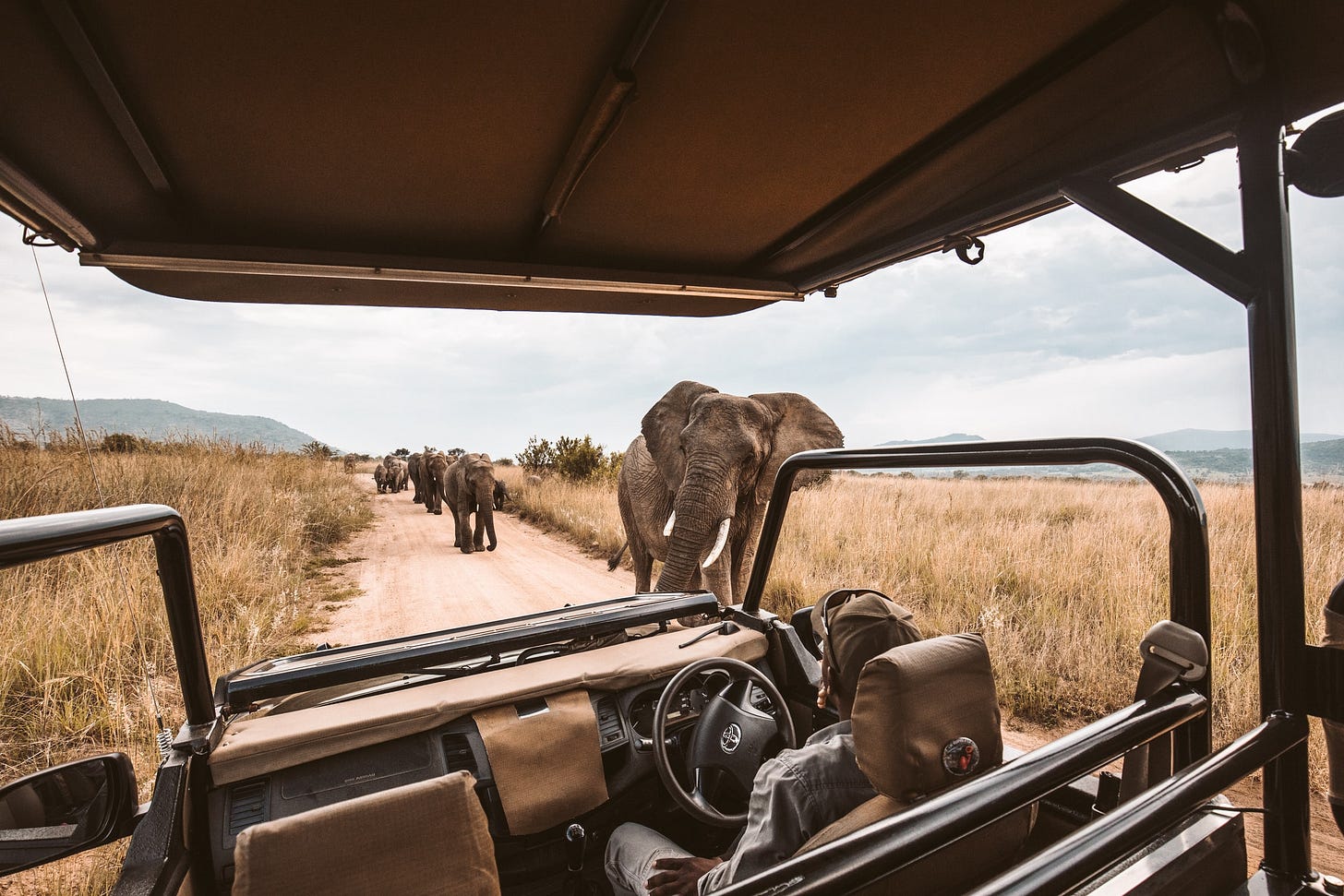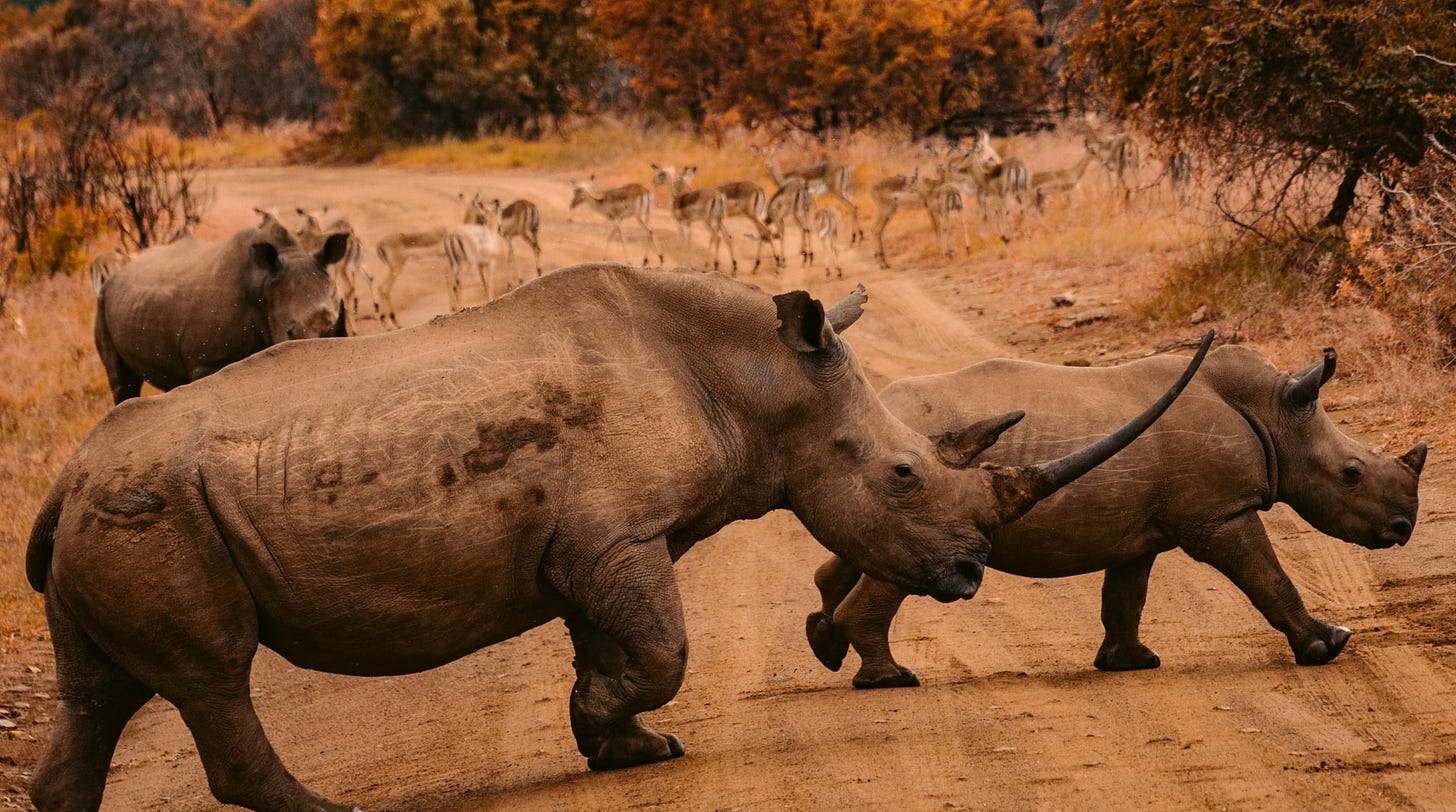Africa Bears the Brunt, Again
Travel bans deal another blow to wildlife conservation in a region that has already suffered too much
Book Update
Reviews continue to roll in for Under a Poacher’s Moon, and the book is now available on NetGalley for authors, book reviewers, librarians, or bloggers to review an advanced copy. If you know a blogger or someone else who might want to review the book, please let me know or forward them this email.
Under a Poacher’s Moon is available for Pre-Order on Amazon and through all major online retailers, and independent bookstores (if you have a favorite local bookstore they can order it for you), prior to release on February 1, 2022. It would make a great gift for readers who love wildlife, travel, adventure, and just a good story.
Africa Bears the Brunt, Again
Is there any aspect of life on the planet that hasn’t been affected by the strange events sweeping the globe the last two years? How about rhinos and elephants and lions in Africa, and the people who work to protect these ancient species that have walked the globe for millions of years? You probably haven’t thought much about how COVID rules and restrictions have affected them, if you’re like most people.
I found myself shaking my head this week as the U.S. and other world governments imposed crushing travel bans on eight countries of southern Africa. Tourism is a vital part of many African economies and provides an important source of funding for wildlife conservation. Africa’s wildlife tourism was devastated by global “lockdowns” in 2020, and was clawing its way back in 2021, only to now be cruelly sent back to square one by these new bans.
In South Africa, global lockdowns reduced tourism to National Parks and other wildlife reserves by as much as 96%. In Botswana the 2020 lockdowns led to about 99% of the country’s tourism workforce being temporarily or permanently laid off. 7.2 million Africans lost their jobs in tourism in 2020. Lockdowns and travel restrictions wiped out $4.5 trillion from the global tourism industry in 2020, and was projected to cost another $1.7-2.4 trillion in 2021; Africa’s share of that loss in 2021 was projected to be $170-253 billion. This was before the new travel bans. (Source)
In the absence of paying tourists from abroad, safari operators, game reserves, and National Parks cannot afford to keep workers employed, nor in some cases keep the properties managed properly, which means the animals become more susceptible to threats like poaching, and protected habitat is turned to other uses like agriculture. Some private properties cannot keep animals properly fed.
Of course, the economic damage from travel bans in southern Africa goes far beyond conservation.
A wide array of critics from across the political spectrum are raising their voices against these new travel bans. The UN Secretary-General Antonio Guterres called them “travel apartheid.” The President of Malawi labeled them “Afrophobia.” The comedian Trevor Noah said that “as a South African, I think this travel ban is total bulls***. It [the Omicron variant] is everywhere from Hong Kong, to Israel to Spain, so why aren't you banning travel from all of those countries too?” Some political leaders in the U.S. have pointed out that Biden severely criticized the last administration for imposing a nearly identical travel ban on African countries last year.
Even public health experts seem to be having cold feet on this one. “You close down the boundary with Africa, then you close the boundary with Belgium, then you close the boundary with somewhere else,” said Alessandro Vespignani, a professor at Northeastern University who has studied travel restrictions. “But every time you close it, it’s a little late.”
A little late. In other words, governments can’t close borders faster than an airborne respiratory virus can spread. Bans are especially absurd once the variant has already been found in your country.
Even Fauci himself, not usually one for second-guessing draconian dictates, said he “felt really badly” about the travel bans.
These new travel bans are of a piece with global lockdown policies which have disproportionately affected those least able to bear the cost—the poor and the vulnerable. The lockdown approach has plunged hundreds of millions of people into “dire poverty,” including at least 150 million children. Dr. Sunetra Gupta of Oxford said a year ago, “Lockdowns are a luxury of the affluent within countries, and of affluent countries.”
So why do such destructive, irrational bans and closures persist?
That question could be asked with regard to many policies these days. In this case, “it seems we, the African continent, are the scapegoat,” said Richard de la Ray, who organizes safaris in southern Africa.
A “scapegoat,” i.e. someone to blame for failures that lie elsewhere.
“The African travel ban is rooted in media alarmism and politics, not science,” said another African travel professional. “And it will have disastrous consequences for a continent that has already been beaten down by Covid . . . it is just plain wrong.”
Let’s hope these cruel and misguided travel bans are short-lived, and serve as an example of what not to do going forward. They provide a vivid illustration of the extreme collateral damage that ensues from a singleminded focus on one threat to the exclusion of all other concerns.
In the meantime, now would be a good time to give to a wildlife conservation group in southern Africa. One of the groups I know and like is the International Anti-Poaching Foundation (IAPF).
Praise for Under a Poacher’s Moon
"An American woman looks for adventure on safari and instead finds a passion for a cause in Vandiver's debut novel . . . Vandiver has carefully and cleverly crafted a tale with an endearing and relatable protagonist. Over the course of the tale, the author not only draws on his experience and knowledge of the story's landscape--he's an attorney and conservationist--but also shows a great ability to delve into a varied range of human experience. He treats all his characters with notable empathy, effectively showing how one's perspective is shaped by one's choices and circumstances. This is not a straightforward good-versus-evil story, but it is a complex and engaging one. An exciting and thought-provoking work that will stay with readers." Kirkus Reviews
"Under a Poacher's Moon is a compelling, character-driven thriller that digs into Africa's beauty and poverty . . . it's alive with vivid descriptions of the African landscape and animals ("this terribly gorgeous specimen of muscle, sinew, teeth, claw, mane") plus memorable characters." BookLife Reviews
"W. Aaron Vandiver's descriptions of Africa's lush natural wonders weave a magical web that's hard to escape . . . The exotic wildlife and lush landscapes evoke a sense of primal passion, which Vandiver captures perfectly in prose." IndieReader
"In the novel Under a Poacher's Moon, a woman facing an uncertain future undertakes an exciting adventure in the African bush . . . suspenseful and unpredictable." Foreword Clarion Reviews
"A stunning and heartrending adventure story. W. Aaron Vandiver's impressive debut novel transports the reader to the bushveld of Africa . . . Vandiver delivers a gut-wrenching story about the scourge of poaching. Message novels can be heavyhanded, polemic. This is not. It is a nuanced, even a compassionate tale about evil and heartbreak. Highly recommended." Len Joy, author of Everyone Dies Famous, Better Days, and Dry Heat.
Reading Recommendations
If I could recommend one thing for people to read right now it would be an essay by Paul Kingsnorth, (available on Substackor Unherd), in which he tackles the world’s most controversial issue at the moment in clear, lucid, and incisive writing. Not everyone will agree (a serious understatement), but even those who tend to dismiss similar arguments out of hand will have a hard time ignoring the power of his words. I like Kingsnorth because not only is he a brilliant writer, he is also a lover of nature but, like me, he is an unorthodox thinker who cannot be labeled a typical “environmentalist” and does not fit neatly in any political category. He also is a strong supporter of human rights and has an instinctive aversion to authoritarianism in any form (whether right or left)—traits I admire and try to live up to as writer and a person.








